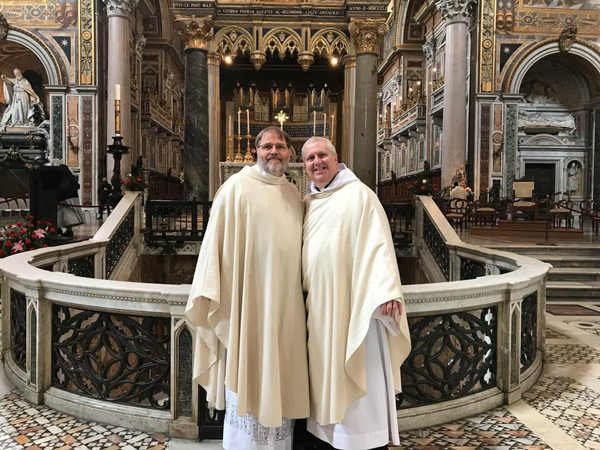When Fathers David Brownfield and Marty Goetz were commissioned by Pope Francis in 2016 to become Missionaries of Mercy, their commitment wasn’t limited to the Year of Mercy. It continues until the pope decides Missionaries of Mercy are no longer needed in the church.

Fathers David Brownfield, left, and Marty Goetz, pose inside St. Peter’s Basilica at the Vatican last month. The two priests were in Rome for a Missionaries of Mercy conference.
The two diocesan priests recently returned from a conference in Rome for priests designated as Missionaries of Mercy. They also had a special audience with Pope Francis. The conference focused on encouraging the pope’s vision of mercy and the need for the sacrament of reconciliation, said Fr. Brownfield, pastor of Holy Trinity-Richmond, St. Mary-Riverside and St. Joseph Parish-Wellman.
The conference provided an opportunity “for us to come together and share stories and support each other in our ministry,” said Fr. Goetz, pastor of Divine Mercy-Burlington-West Burlington and St. Mary-Dodgeville. “We were also told that our mission would be extended past the Holy Year of Mercy.”
A highlight for both priests was personally meeting Pope Francis during the special audience April 10. Both priests say they will cherish that memory. They were among 550 Missionaries of Mercy at the conference who had a special audience with the Holy Father.
Other highlights for Fr. Brownfield were two papal Masses, one at St. Peter’s Basilica and the Archbasilica of St. John Lateran. For Fr. Goetz, another highlight was “to be affirmed in my ministry as a Missionary of Mercy. I don’t think people know what we are all about, but I see it as a valuable ministry, especially to our brother priests.”
The priests participated in a prayer vigil April 7 that included the sacrament of reconciliation at the Church of Santo Spirito in Sassia. They concelebrated Divine Mercy Sunday Mass with Pope Francis in St. Peter’s Square on April 8. The following day, they listened to a talk on reconciliation by Cardinal Robert Sarah. He is prefect for the Congregation for Divine Worship and the Sacraments. That day they also listened to a talk on sin and mercy in the life of a priest given by Archbishop Arthur Roche. He is secretary for the Congregation for Divine Worship and the Discipline of the Sacraments.
On April 10, they listened to a lecture by Archbishop Rino Fisichella on the Missionary of Mercy. Archbishop Fisichella is president of the Pontifical Council for the Promotion of the New Evangelization. Archbishop Jose Ruiz Arenas, secretary for the Pontifical Council for Promoting New Evangelization, gave a lecture on the sacrament of reconciliation April 11.
Fr. Brownfield sees his Missionary of Mercy role as “being a living witness of mercy who encourages reconciliation with God with the faculty to forgive many reserved sins. According to Archbishop Fisichella, the two-fold mission of the Missionaries of Mercy is to be preachers of mercy and to be open to reconciling people to God.”
“It is a great honor that I am able to help other people know the mercy and love of God,” Fr. Goetz said. “I often ask people at communal penance services what is harder: coming in or standing in line! People feel a lot of different things when they approach us in the confessional — guilt or shame or unworthiness are some of the big ones. I try to help them know that God’s love is bigger than that. I’ve been there, so I think I can help.”
Both priests believe their roles as Missionaries of Mercy enhance their ministry to their parishes. The focus for Pope Francis is living mercy as well as preaching it. Fr. Goetz feels honored and overjoyed when someone seeks him out for this special ministry.
“I think Pope Francis sees the sacrament of reconciliation as an important part of the New Evangelization,” Fr. Brownfield said. “To grow in mercy requires us to realize our need for God’s mercy and experience that mercy as in the sacrament of reconciliation. When we grow in mercy, we deepen our faith in God, a call of the New Evangelization.
“A common theme of Pope Francis and the other speakers is that confessions should not be a torture chamber but rather an experience of joy that comes from true sorrow for ones sins and embracing God’s mercy,” Fr. Brownfield said. “Contrition or sorrow for sin is essential for the sacrament. However, if we can’t be sorry for our sins, the sorrow over not being able to be sorry can be a great start in getting us to grow in mercy. Mercy is a permanent prophecy in the church and the heart of new evangelization.”
Fr. Goetz had an opportunity to practice mercy after being victimized by a pickpocket on the train. “I was really angry at this person but at the end of the day I was able to give (that person) to God and ask God to watch over them. I try to practice what I preach.”
– By Anne Marie Amacher
The Catholic Messenger











